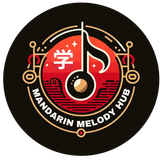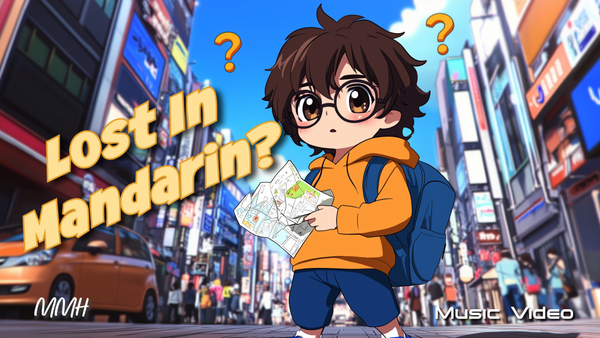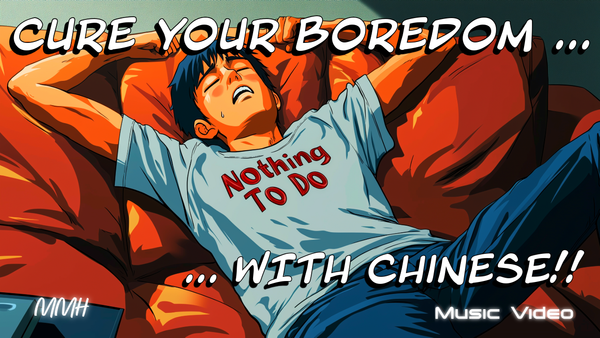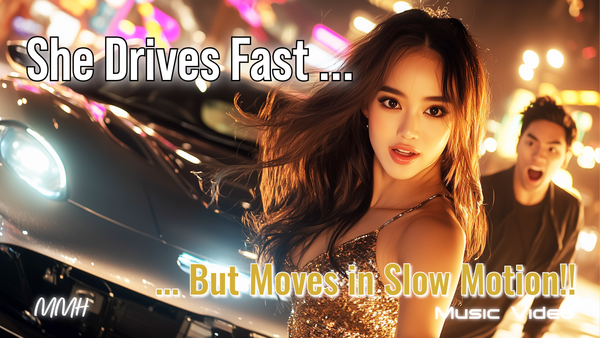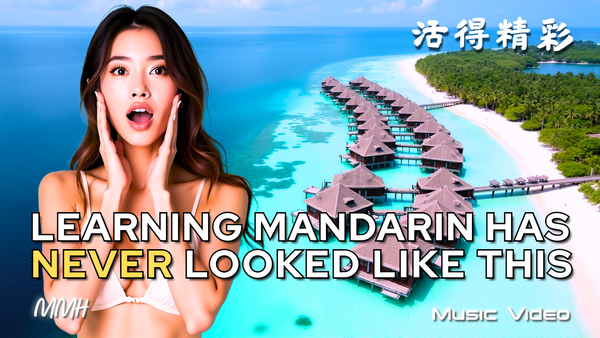When Love Transcends Time: Eternal Love Vocabulary
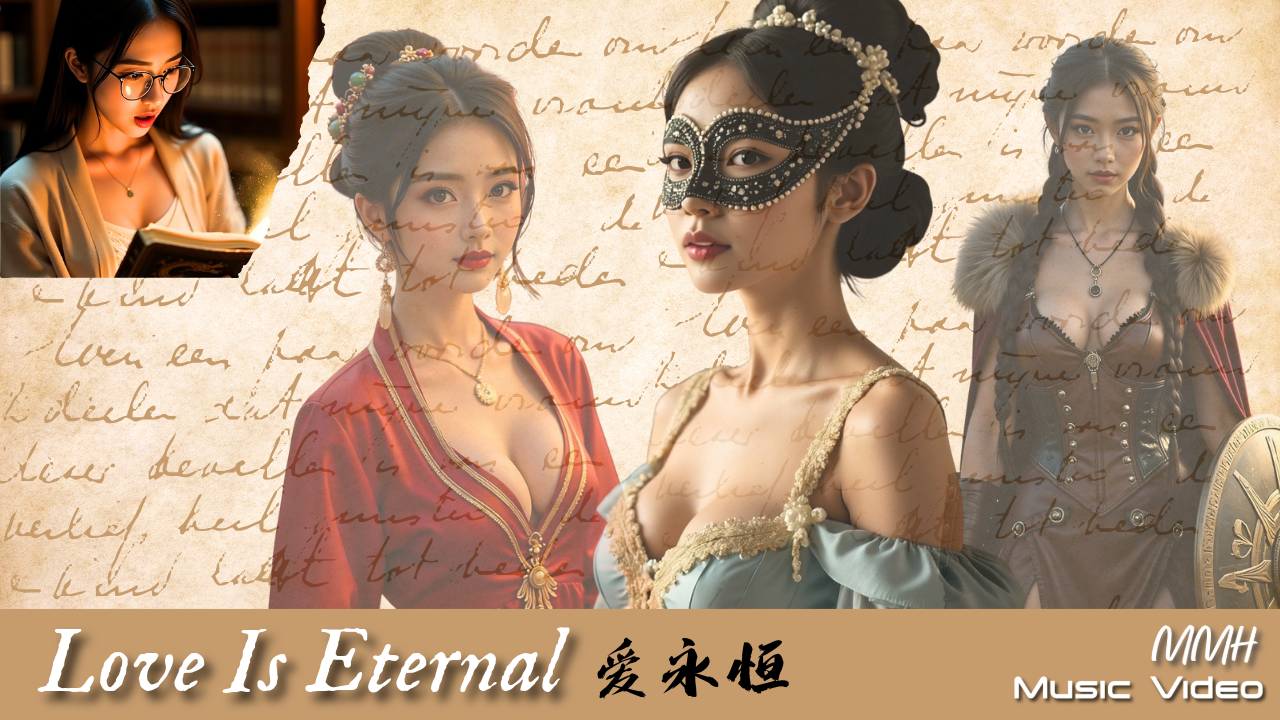
Experience a cinematic journey through time where love conquers all historical boundaries
Originally released 3/27/2025
🎵 Watch & Listen
🎮 Practice with Interactive Flashcards
Master all the romantic and time-travel vocabulary from 'Eternal Love'! This fantasy-inspired music video uses immersive storytelling to make Chinese vocabulary unforgettable.
→ Practice "Eternal Love" Flashcards
The Story Behind the Song
"Eternal Love" takes you on an extraordinary cinematic adventure that feels more like watching a blockbuster film than studying Chinese. The story follows a young woman who discovers a mysterious glowing book in a library that becomes her portal through time. From the golden sands of Ancient Egypt to the imperial courts of Tang Dynasty China, from Viking battlefields to the elegant ballrooms of 18th-century France, she experiences love across the ages - only to find her true romance waiting in the present day.
This isn't just another Chinese vocabulary song - it's a masterclass in how language learning can be deeply emotional and visually stunning. The song weaves together essential Mandarin vocabulary for expressing love, time, history, and destiny while immersing you in rich cultural contexts that make each word unforgettable. You'll learn romantic expressions, historical terms, and poetic language through some of the most beautiful cinematography ever created for language learning.
What makes "Eternal Love" particularly special for Chinese learners is how it bridges ancient and modern Chinese expression. The vocabulary spans from classical poetic phrases about eternal devotion to contemporary ways of expressing romantic feelings. Each historical era introduces culture-specific vocabulary while the modern scenes ground you in practical, everyday romantic Chinese that you can actually use. It's the perfect blend of linguistic beauty and practical application, proving that learning Chinese can be as epic and emotionally satisfying as any Hollywood romance.
Complete Song Lyrics
Verse 1
{历史|lì shǐ - history}{的|de - possessive}{风景|fēng jǐng - scenery} ({lì shǐ|历史 - history} {de|的 - possessive} {fēng jǐng|风景 - scenery})
The scenery of history
{在|zài - at}{眼前|yǎn qián - before eyes}{展开|zhǎn kāi - unfold} ({zài|在 - at} {yǎn qián|眼前 - before eyes} {zhǎn kāi|展开 - unfold})
Unfolds before my eyes
{不同|bù tóng - different}{的|de - possessive}{习惯|xí guàn - habits} ({bù tóng|不同 - different} {de|的 - possessive} {xí guàn|习惯 - habits})
Different habits
{不同|bù tóng - different}{的|de - possessive}{文化|wén huà - culture} ({bù tóng|不同 - different} {de|的 - possessive} {wén huà|文化 - culture})
Different cultures
{新鲜|xīn xiān - fresh}{的|de - possessive}{感觉|gǎn jué - feeling} ({xīn xiān|新鲜 - fresh} {de|的 - possessive} {gǎn jué|感觉 - feeling})
A fresh feeling
Pre-Chorus 1
{穿越|chuān yuè - cross through}{时空|shí kōng - time and space} ({chuān yuè|穿越 - cross through} {shí kōng|时空 - time and space})
Crossing through time and space
{体验|tǐ yàn - experience}{生活|shēng huó - life} ({tǐ yàn|体验 - experience} {shēng huó|生活 - life})
Experiencing life
{每个|měi gè - every}{时代|shí dài - era}{都|dōu - all}{有|yǒu - have}{特色|tè sè - characteristics} ({měi gè|每个 - every} {shí dài|时代 - era} {dōu|都 - all} {yǒu|有 - have} {tè sè|特色 - characteristics})
Every era has its own characteristics
Chorus 1
{不同|bù tóng - different}{的|de - possessive}{时代|shí dài - era} ({bù tóng|不同 - different} {de|的 - possessive} {shí dài|时代 - era})
Different eras
{相同|xiāng tóng - same}{的|de - possessive}{心情|xīn qíng - feelings} ({xiāng tóng|相同 - same} {de|的 - possessive} {xīn qíng|心情 - feelings})
Same feelings
{时光|shí guāng - time}{在|zài - at}{转变|zhuǎn biàn - transform} ({shí guāng|时光 - time} {zài|在 - at} {zhuǎn biàn|转变 - transform})
Time is transforming
{爱|ài - love}{却|què - but}{永恒|yǒng héng - eternal} ({ài|爱 - love} {què|却 - but} {yǒng héng|永恒 - eternal})
But love is eternal
Verse 2
{华丽|huá lì - magnificent}{的|de - possessive}{衣服|yī fú - clothes} ({huá lì|华丽 - magnificent} {de|的 - possessive} {yī fú|衣服 - clothes})
Magnificent clothes
{优雅|yōu yǎ - elegant}{的|de - possessive}{帽子|mào zi - hat} ({yōu yǎ|优雅 - elegant} {de|的 - possessive} {mào zi|帽子 - hat})
Elegant hats
{不同|bù tóng - different}{的|de - possessive}{发型|fà xíng - hairstyle} ({bù tóng|不同 - different} {de|的 - possessive} {fà xíng|发型 - hairstyle})
Different hairstyles
{不同|bù tóng - different}{的|de - possessive}{鞋子|xié zi - shoes} ({bù tóng|不同 - different} {de|的 - possessive} {xié zi|鞋子 - shoes})
Different shoes
{世界|shì jiè - world}{在|zài - at}{变化|biàn huà - change} ({shì jiè|世界 - world} {zài|在 - at} {biàn huà|变化 - change})
The world is changing
Pre-Chorus 2
{翻开|fān kāi - turn open}{书本|shū běn - book} ({fān kāi|翻开 - turn open} {shū běn|书本 - book})
Opening the book
{穿越|chuān yuè - cross through}{岁月|suì yuè - years} ({chuān yuè|穿越 - cross through} {suì yuè|岁月 - years})
Crossing through the years
{每段|měi duàn - every section}{历史|lì shǐ - history}{都|dōu - all}{有|yǒu - have}{故事|gù shì - story} ({měi duàn|每段 - every section} {lì shǐ|历史 - history} {dōu|都 - all} {yǒu|有 - have} {gù shì|故事 - story})
Every period of history has its story
Chorus 2
{不同|bù tóng - different}{的|de - possessive}{时代|shí dài - era} ({bù tóng|不同 - different} {de|的 - possessive} {shí dài|时代 - era})
Different eras
{相同|xiāng tóng - same}{的|de - possessive}{心情|xīn qíng - feelings} ({xiāng tóng|相同 - same} {de|的 - possessive} {xīn qíng|心情 - feelings})
Same feelings
{时光|shí guāng - time}{在|zài - at}{转变|zhuǎn biàn - transform} ({shí guāng|时光 - time} {zài|在 - at} {zhuǎn biàn|转变 - transform})
Time is transforming
{爱|ài - love}{却|què - but}{永恒|yǒng héng - eternal} ({ài|爱 - love} {què|却 - but} {yǒng héng|永恒 - eternal})
But love is eternal
Pre-Chorus 3
{翻开|fān kāi - turn open}{书本|shū běn - book} ({fān kāi|翻开 - turn open} {shū běn|书本 - book})
Opening the book
{穿越|chuān yuè - cross through}{岁月|suì yuè - years} ({chuān yuè|穿越 - cross through} {suì yuè|岁月 - years})
Crossing through the years
{每段|měi duàn - every section}{历史|lì shǐ - history}{都|dōu - all}{有|yǒu - have}{故事|gù shì - story} ({měi duàn|每段 - every section} {lì shǐ|历史 - history} {dōu|都 - all} {yǒu|有 - have} {gù shì|故事 - story})
Every period of history has its story
Chorus 3
{不同|bù tóng - different}{的|de - possessive}{时代|shí dài - era} ({bù tóng|不同 - different} {de|的 - possessive} {shí dài|时代 - era})
Different eras
{相同|xiāng tóng - same}{的|de - possessive}{心情|xīn qíng - feelings} ({xiāng tóng|相同 - same} {de|的 - possessive} {xīn qíng|心情 - feelings})
Same feelings
{时光|shí guāng - time}{在|zài - at}{转变|zhuǎn biàn - transform} ({shí guāng|时光 - time} {zài|在 - at} {zhuǎn biàn|转变 - transform})
Time is transforming
{爱|ài - love}{却|què - but}{永恒|yǒng héng - eternal} ({ài|爱 - love} {què|却 - but} {yǒng héng|永恒 - eternal})
But love is eternal
Final Chorus
{不同|bù tóng - different}{的|de - possessive}{时代|shí dài - era} ({bù tóng|不同 - different} {de|的 - possessive} {shí dài|时代 - era})
Different eras
{相同|xiāng tóng - same}{的|de - possessive}{心情|xīn qíng - feelings} ({xiāng tóng|相同 - same} {de|的 - possessive} {xīn qíng|心情 - feelings} )
Same feelings
{时光|shí guāng - time}{在|zài - at}{转变|zhuǎn biàn - transform} ({shí guāng|时光 - time} {zài|在 - at} {zhuǎn biàn|转变 - transform})
Time is transforming
{爱|ài - love}{却|què - but}{永恒|yǒng héng - eternal} ({ài|爱 - love} {què|却 - but} {yǒng héng|永恒 - eternal})
But love is eternal
{从|cóng - from}{过去|guò qù - past}{到|dào - to}{未来|wèi lái - future} ({cóng|从 - from} {guò qù|过去 - past} {dào|到 - to} {wèi lái|未来 - future})
From past to future
{心|xīn - heart}{不会|bù huì - will not}{改变|gǎi biàn - change} ({xīn|心 - heart} {bù huì|不会 - will not} {gǎi biàn|改变 - change})
The heart will not change
{不管|bù guǎn - no matter}{在|zài - at}{哪里|nǎ lǐ - where} ({bù guǎn|不管 - no matter} {zài|在 - at} {nǎ lǐ|哪里 - where})
No matter where
{爱|ài - love}{永远|yǒng yuǎn - forever}{不变|bù biàn - unchanging} ({ài|爱 - love} {yǒng yuǎn|永远 - forever} {bù biàn|不变 - unchanging})
Love is forever unchanging
Complete Vocabulary List
Master every Chinese word from this song with our comprehensive vocabulary breakdown, organized by HSK difficulty level for systematic learning.
Basic Vocabulary (HSK 1-2)
- {的|de - possessive} ({de|的 - possessive}) = possessive particle [HSK1]
- {在|zài - at} ({zài|在 - at}) = at, in, on [HSK1]
- {有|yǒu - have} ({yǒu|有 - have}) = to have, there is/are [HSK1]
- {都|dōu - all} ({dōu|都 - all}) = all, both [HSK1]
- {不|bù - not} ({bù|不 - not}) = no, not [HSK1]
- {爱|ài - love} ({ài|爱 - love}) = love [HSK1]
- {到|dào - to} ({dào|到 - to}) = to arrive, to [HSK1]
- {心|xīn - heart} ({xīn|心 - heart}) = heart [HSK1]
- {世界|shì jiè - world} ({shì jiè|世界 - world}) = world [HSK2]
- {生活|shēng huó - life} ({shēng huó|生活 - life}) = life, to live [HSK2]
- {书本|shū běn - book} ({shū běn|书本 - book}) = book [HSK2]
- {衣服|yī fú - clothes} ({yī fú|衣服 - clothes}) = clothes [HSK2]
- {鞋子|xié zi - shoes} ({xié zi|鞋子 - shoes}) = shoes [HSK2]
- {帽子|mào zi - hat} ({mào zi|帽子 - hat}) = hat [HSK2]
- {每个|měi gè - every} ({měi gè|每个 - every}) = every, each [HSK2]
- {永远|yǒng yuǎn - forever} ({yǒng yuǎn|永远 - forever}) = forever, always [HSK2]
- {改变|gǎi biàn - change} ({gǎi biàn|改变 - change}) = to change [HSK2]
- {哪里|nǎ lǐ - where} ({nǎ lǐ|哪里 - where}) = where [HSK2]
Intermediate Vocabulary (HSK 3-4)
- {历史|lì shǐ - history} ({lì shǐ|历史 - history}) = history [HSK3]
- {风景|fēng jǐng - scenery} ({fēng jǐng|风景 - scenery}) = scenery, landscape [HSK3]
- {展开|zhǎn kāi - unfold} ({zhǎn kāi|展开 - unfold}) = to unfold, to expand [HSK3]
- {不同|bù tóng - different} ({bù tóng|不同 - different}) = different [HSK3]
- {习惯|xí guàn - habits} ({xí guàn|习惯 - habits}) = habit, to be used to [HSK3]
- {文化|wén huà - culture} ({wén huà|文化 - culture}) = culture [HSK3]
- {新鲜|xīn xiān - fresh} ({xīn xiān|新鲜 - fresh}) = fresh, new [HSK3]
- {感觉|gǎn jué - feeling} ({gǎn jué|感觉 - feeling}) = feeling, to feel [HSK3]
- {时代|shí dài - era} ({shí dài|时代 - era}) = era, times [HSK3]
- {相同|xiāng tóng - same} ({xiāng tóng|相同 - same}) = same, identical [HSK3]
- {心情|xīn qíng - feelings} ({xīn qíng|心情 - feelings}) = mood, feelings [HSK3]
- {时光|shí guāng - time} ({shí guāng|时光 - time}) = time [HSK3]
- {却|què - but} ({què|却 - but}) = but, however [HSK3]
- {华丽|huá lì - magnificent} ({huá lì|华丽 - magnificent}) = magnificent, splendid [HSK4]
- {优雅|yōu yǎ - elegant} ({yōu yǎ|优雅 - elegant}) = elegant, graceful [HSK4]
- {发型|fà xíng - hairstyle} ({fà xíng|发型 - hairstyle}) = hairstyle [HSK4]
- {变化|biàn huà - change} ({biàn huà|变化 - change}) = change, to change [HSK4]
- {翻开|fān kāi - turn open} ({fān kāi|翻开 - turn open}) = to open, to turn over [HSK4]
- {岁月|suì yuè - years} ({suì yuè|岁月 - years}) = years, time [HSK4]
- {每段|měi duàn - every section} ({měi duàn|每段 - every section}) = every section/period [HSK4]
- {故事|gù shì - story} ({gù shì|故事 - story}) = story [HSK4]
- {转变|zhuǎn biàn - transform} ({zhuǎn biàn|转变 - transform}) = to transform, to change [HSK4]
- {过去|guò qù - past} ({guò qù|过去 - past}) = past [HSK4]
- {未来|wèi lái - future} ({wèi lái|未来 - future}) = future [HSK4]
- {不会|bù huì - will not} ({bù huì|不会 - will not}) = will not, cannot [HSK4]
- {不管|bù guǎn - no matter} ({bù guǎn|不管 - no matter}) = no matter, regardless of [HSK4]
- {不变|bù biàn - unchanging} ({bù biàn|不变 - unchanging}) = unchanging, constant [HSK4]
Advanced/Specialized Vocabulary
- {眼前|yǎn qián - before eyes} ({yǎn qián|眼前 - before eyes}) = before one's eyes, in front of [HSK5]
- {穿越|chuān yuè - cross through} ({chuān yuè|穿越 - cross through}) = to cross, to traverse [Advanced]
- {时空|shí kōng - time and space} ({shí kōng|时空 - time and space}) = time and space [Advanced]
- {体验|tǐ yàn - experience} ({tǐ yàn|体验 - experience}) = to experience [HSK5]
- {特色|tè sè - characteristics} ({tè sè|特色 - characteristics}) = characteristics, distinctive features [HSK5]
- {永恒|yǒng héng - eternal} ({yǒng héng|永恒 - eternal}) = eternal, everlasting [Advanced]
- {从|cóng - from} ({cóng|从 - from}) = from [HSK2]
Line-by-Line Analysis
Understanding the grammar and structure behind every line helps you build strong foundational knowledge for natural Chinese expression.
Verse 1
{历史|lì shǐ - history}{的|de - possessive}{风景|fēng jǐng - scenery} ({lì shǐ|历史 - history} {de|的 - possessive} {fēng jǐng|风景 - scenery} - the scenery of history)
- Grammar: Noun + 的 + Noun (possessive structure)
- Key Point: 的 creates a possessive relationship between abstract concept (历史) and concrete noun (风景)
- Structure: 历史的风景 (lì shǐ de fēng jǐng - history's scenery) creates poetic imagery
{在|zài - at}{眼前|yǎn qián - before eyes}{展开|zhǎn kāi - unfold} ({zài|在 - at} {yǎn qián|眼前 - before eyes} {zhǎn kāi|展开 - unfold} - unfolds before my eyes)
- Grammar: Location marker + Place + Verb
- Key Point: 在 indicates where the action takes place
- Structure: 在眼前 (zài yǎn qián - before eyes) + 展开 (zhǎn kāi - unfold)
{不同|bù tóng - different}{的|de - possessive}{习惯|xí guàn - habits} ({bù tóng|不同 - different} {de|的 - possessive} {xí guàn|习惯 - habits} - different habits)
- Grammar: Adjective + 的 + Noun
- Key Point: 不同 functions as an attributive adjective modifying 习惯
- Structure: 不同的 (bù tóng de - different) + 习惯 (xí guàn - habits)
{不同|bù tóng - different}{的|de - possessive}{文化|wén huà - culture} ({bù tóng|不同 - different} {de|的 - possessive} {wén huà|文化 - culture} - different cultures)
- Grammar: Adjective + 的 + Noun
- Key Point: Repetition of 不同的 creates parallel structure and emphasis
- Structure: Same pattern as previous line, reinforcing the theme of diversity
{新鲜|xīn xiān - fresh}{的|de - possessive}{感觉|gǎn jué - feeling} ({xīn xiān|新鲜 - fresh} {de|的 - possessive} {gǎn jué|感觉 - feeling} - a fresh feeling)
- Grammar: Adjective + 的 + Noun
- Key Point: 新鲜 adds emotional color to the abstract noun 感觉
- Structure: 新鲜的感觉 (xīn xiān de gǎn jué - fresh feeling) concludes verse with sensory description
Pre-Chorus 1
{穿越|chuān yuè - cross through}{时空|shí kōng - time and space} ({chuān yuè|穿越 - cross through} {shí kōng|时空 - time and space} - crossing through time and space)
- Grammar: Verb + Object
- Key Point: 穿越 is a compound verb meaning to pass through or traverse
- Structure: 穿越 (chuān yuè - cross through) + 时空 (shí kōng - time and space)
{体验|tǐ yàn - experience}{生活|shēng huó - life} ({tǐ yàn|体验 - experience} {shēng huó|生活 - life} - experiencing life)
- Grammar: Verb + Object
- Key Point: 体验 emphasizes personal, hands-on experience rather than observation
- Structure: 体验 (tǐ yàn - experience) + 生活 (shēng huó - life)
{每个|měi gè - every}{时代|shí dài - era}{都|dōu - all}{有|yǒu - have}{特色|tè sè - characteristics} ({měi gè|每个 - every} {shí dài|时代 - era} {dōu|都 - all} {yǒu|有 - have} {tè sè|特色 - characteristics} - every era has its characteristics)
- Grammar: Subject + 都 + Verb + Object
- Key Point: 都 emphasizes universality - without exception, every era has characteristics
- Structure: 每个时代 (měi gè shí dài - every era) + 都有 (dōu yǒu - all have) + 特色 (tè sè - characteristics)
Chorus 1
{不同|bù tóng - different}{的|de - possessive}{时代|shí dài - era} ({bù tóng|不同 - different} {de|的 - possessive} {shí dài|时代 - era} - different eras)
- Grammar: Adjective + 的 + Noun (attributive structure)
- Key Point: Sets up contrast theme - different vs. same that runs through chorus
- Structure: 不同的时代 (bù tóng de shí dài - different eras) as subject
{相同|xiāng tóng - same}{的|de - possessive}{心情|xīn qíng - feelings} ({xiāng tóng|相同 - same} {de|的 - possessive} {xīn qíng|心情 - feelings} - same feelings)
- Grammar: Adjective + 的 + Noun
- Key Point: 相同 contrasts with 不同, showing universal human emotions across time
- Structure: 相同的心情 (xiāng tóng de xīn qíng - same feelings) creates thematic balance
{时光|shí guāng - time}{在|zài - at}{转变|zhuǎn biàn - transform} ({shí guāng|时光 - time} {zài|在 - at} {zhuǎn biàn|转变 - transform} - time is transforming)
- Grammar: Subject + 在 + Verb (progressive aspect)
- Key Point: 在 + Verb indicates ongoing action - time is continuously changing
- Structure: 时光在转变 (shí guāng zài zhuǎn biàn - time is transforming)
{爱|ài - love}{却|què - but}{永恒|yǒng héng - eternal} ({ài|爱 - love} {què|却 - but} {yǒng héng|永恒 - eternal} - but love is eternal)
- Grammar: Subject + 却 + Adjective (contrastive structure)
- Key Point: 却 creates strong contrast - while everything changes, love remains constant
- Structure: 爱却永恒 (ài què yǒng héng - love is however eternal) as core message
Verse 2
{华丽|huá lì - magnificent}{的|de - possessive}{衣服|yī fú - clothes} ({huá lì|华丽 - magnificent} {de|的 - possessive} {yī fú|衣服 - clothes} - magnificent clothes)
- Grammar: Adjective + 的 + Noun
- Key Point: 华丽 adds visual richness, describing historical costume details
- Structure: 华丽的衣服 (huá lì de yī fú - magnificent clothes)
{优雅|yōu yǎ - elegant}{的|de - possessive}{帽子|mào zi - hat} ({yōu yǎ|优雅 - elegant} {de|的 - possessive} {mào zi|帽子 - hat} - elegant hats)
- Grammar: Adjective + 的 + Noun
- Key Point: 优雅 emphasizes refinement and grace of historical fashion
- Structure: 优雅的帽子 (yōu yǎ de mào zi - elegant hats)
{不同|bù tóng - different}{的|de - possessive}{发型|fà xíng - hairstyle} ({bù tóng|不同 - different} {de|的 - possessive} {fà xíng|发型 - hairstyle} - different hairstyles)
- Grammar: Adjective + 的 + Noun
- Key Point: Returns to 不同 theme, showing cultural diversity through appearance
- Structure: 不同的发型 (bù tóng de fà xíng - different hairstyles)
{不同|bù tóng - different}{的|de - possessive}{鞋子|xié zi - shoes} ({bù tóng|不同 - different} {de|的 - possessive} {xié zi|鞋子 - shoes} - different shoes)
- Grammar: Adjective + 的 + Noun
- Key Point: Parallel repetition reinforces diversity theme across eras
- Structure: 不同的鞋子 (bù tóng de xié zi - different shoes)
{世界|shì jiè - world}{在|zài - at}{变化|biàn huà - change} ({shì jiè|世界 - world} {zài|在 - at} {biàn huà|变化 - change} - the world is changing)
- Grammar: Subject + 在 + Verb (progressive aspect)
- Key Point: 在 + 变化 shows continuous, ongoing change of the world
- Structure: 世界在变化 (shì jiè zài biàn huà - world is changing)
Pre-Chorus 2
{翻开|fān kāi - turn open}{书本|shū běn - book} ({fān kāi|翻开 - turn open} {shū běn|书本 - book} - opening the book)
- Grammar: Verb + Object
- Key Point: 翻开 suggests revealing or uncovering, metaphor for discovery
- Structure: 翻开书本 (fān kāi shū běn - opening the book) as gateway to time travel
{穿越|chuān yuè - cross through}{岁月|suì yuè - years} ({chuān yuè|穿越 - cross through} {suì yuè|岁月 - years} - crossing through the years)
- Grammar: Verb + Object
- Key Point: 岁月 is more poetic than 时间, suggesting passage of meaningful time
- Structure: 穿越岁月 (chuān yuè suì yuè - crossing through years)
{每段|měi duàn - every section}{历史|lì shǐ - history}{都|dōu - all}{有|yǒu - have}{故事|gù shì - story} ({měi duàn|每段 - every section} {lì shǐ|历史 - history} {dōu|都 - all} {yǒu|有 - have} {gù shì|故事 - story} - every period of history has its story)
- Grammar: Subject + 都 + Verb + Object
- Key Point: 每段历史 treats history as segmented periods, each with narratives
- Structure: 每段历史 (měi duàn lì shǐ - every period of history) + 都有故事 (dōu yǒu gù shì - all have stories)
Chorus 2
{不同|bù tóng - different}{的|de - possessive}{时代|shí dài - era} ({bù tóng|不同 - different} {de|的 - possessive} {shí dài|时代 - era} - different eras)
- Grammar: Adjective + 的 + Noun (attributive structure)
- Key Point: Repetition reinforces central theme of diversity across time periods
- Structure: 不同的时代 (bù tóng de shí dài - different eras)
{相同|xiāng tóng - same}{的|de - possessive}{心情|xīn qíng - feelings} ({xiāng tóng|相同 - same} {de|的 - possessive} {xīn qíng|心情 - feelings} - same feelings)
- Grammar: Adjective + 的 + Noun
- Key Point: Emphasizes universal human emotional experiences transcending time
- Structure: 相同的心情 (xiāng tóng de xīn qíng - same feelings)
{时光|shí guāng - time}{在|zài - at}{转变|zhuǎn biàn - transform} ({shí guāng|时光 - time} {zài|在 - at} {zhuǎn biàn|转变 - transform} - time is transforming)
- Grammar: Subject + 在 + Verb (progressive aspect)
- Key Point: Continuous aspect shows time as constantly in motion
- Structure: 时光在转变 (shí guāng zài zhuǎn biàn - time is transforming)
{爱|ài - love}{却|què - but}{永恒|yǒng héng - eternal} ({ài|爱 - love} {què|却 - but} {yǒng héng|永恒 - eternal} - but love is eternal)
- Grammar: Subject + 却 + Adjective (contrastive structure)
- Key Point: 却 provides strong contrast - love transcends temporal change
- Structure: 爱却永恒 (ài què yǒng héng - but love is eternal)
Final Chorus
{不同|bù tóng - different}{的|de - possessive}{时代|shí dài - era} ({bù tóng|不同 - different} {de|的 - possessive} {shí dài|时代 - era} - different eras)
- Grammar: Adjective + 的 + Noun
- Key Point: Final repetition of core theme before resolution
- Structure: 不同的时代 (bù tóng de shí dài - different eras)
{相同|xiāng tóng - same}{的|de - possessive}{心情|xīn qíng - feelings} ({xiāng tóng|相同 - same} {de|的 - possessive} {xīn qíng|心情 - feelings} - same feelings)
- Grammar: Adjective + 的 + Noun
- Key Point: Reinforces universal emotional connection across humanity
- Structure: 相同的心情 (xiāng tóng de xīn qíng - same feelings)
{时光|shí guāng - time}{在|zài - at}{转变|zhuǎn biàn - transform} ({shí guāng|时光 - time} {zài|在 - at} {zhuǎn biàn|转变 - transform} - time is transforming)
- Grammar: Subject + 在 + Verb (progressive aspect)
- Key Point: Acknowledgment that change is constant and ongoing
- Structure: 时光在转变 (shí guāng zài zhuǎn biàn - time is transforming)
{爱|ài - love}{却|què - but}{永恒|yǒng héng - eternal} ({ài|爱 - love} {què|却 - but} {yǒng héng|永恒 - eternal} - but love is eternal)
- Grammar: Subject + 却 + Adjective (contrastive structure)
- Key Point: Central message - love as the one constant across all change
- Structure: 爱却永恒 (ài què yǒng héng - but love is eternal)
{从|cóng - from}{过去|guò qù - past}{到|dào - to}{未来|wèi lái - future} ({cóng|从 - from} {guò qù|过去 - past} {dào|到 - to} {wèi lái|未来 - future} - from past to future)
- Grammar: 从…到… (from…to…) structure
- Key Point: 从…到 creates temporal span covering all time periods
- Structure: 从过去到未来 (cóng guò qù dào wèi lái - from past to future)
{心|xīn - heart}{不会|bù huì - will not}{改变|gǎi biàn - change} ({xīn|心 - heart} {bù huì|不会 - will not} {gǎi biàn|改变 - change} - the heart will not change)
- Grammar: Subject + 不会 + Verb (future negative)
- Key Point: 不会 expresses certainty about future - the heart is constant
- Structure: 心不会改变 (xīn bù huì gǎi biàn - heart will not change)
{不管|bù guǎn - no matter}{在|zài - at}{哪里|nǎ lǐ - where} ({bù guǎn|不管 - no matter} {zài|在 - at} {nǎ lǐ|哪里 - where} - no matter where)
- Grammar: 不管 + Question word (unconditional structure)
- Key Point: 不管…哪里 creates universal scope - regardless of location
- Structure: 不管在哪里 (bù guǎn zài nǎ lǐ - no matter where)
{爱|ài - love}{永远|yǒng yuǎn - forever}{不变|bù biàn - unchanging} ({ài|爱 - love} {yǒng yuǎn|永远 - forever} {bù biàn|不变 - unchanging} - love is forever unchanging)
- Grammar: Subject + Adverb + Adjective
- Key Point: 永远不变 emphasizes love's eternal, immutable nature
- Structure: 爱永远不变 (ài yǒng yuǎn bù biàn - love is forever unchanging) as final declaration
Advanced Grammar Points
These key grammar patterns from the song will elevate your Chinese expression and help you sound more natural.
1. Contrastive Structure with 却 (què)
- Pattern: {Subject} + {却|què - but} + {Adjective/Verb}
- Function: Creates strong contrast or unexpected opposition
- Example: {爱|ài - love}{却|què - but}{永恒|yǒng héng - eternal} ({ài|爱 - love} {què|却 - but} {yǒng héng|永恒 - eternal} - but love is eternal)
- Usage: More emphatic than 但是, often used in literary or poetic contexts
2. Progressive Aspect with 在 + Verb
- Pattern: {Subject} + {在|zài - at} + {Verb}
- Function: Indicates ongoing, continuous action in progress
- Example: {时光|shí guāng - time}{在|zài - at}{转变|zhuǎn biàn - transform} ({shí guāng|时光 - time} {zài|在 - at} {zhuǎn biàn|转变 - transform} - time is transforming)
- Usage: Common in both spoken and written Chinese, emphasizes process over completion
3. Universal Scope with 都 (dōu)
- Pattern: {每个|měi gè - every} + {Noun} + {都|dōu - all} + {Verb/Adjective}
- Function: Emphasizes universality and inclusiveness without exception
- Example: {每个|měi gè - every}{时代|shí dài - era}{都|dōu - all}{有|yǒu - have}{特色|tè sè - characteristics} ({měi gè|每个 - every} {shí dài|时代 - era} {dōu|都 - all} {yǒu|有 - have} {tè sè|特色 - characteristics} - every era has its characteristics)
- Usage: Essential for expressing generalizations and emphasizing completeness
4. Temporal Range with 从…到… (cóng…dào…)
- Pattern: {从|cóng - from} + {Time/Place A} + {到|dào - to} + {Time/Place B}
- Function: Expresses movement or span across time or space
- Example: {从|cóng - from}{过去|guò qù - past}{到|dào - to}{未来|wèi lái - future} ({cóng|从 - from} {guò qù|过去 - past} {dào|到 - to} {wèi lái|未来 - future} - from past to future)
- Usage: Very common structure for describing ranges, journeys, or development over time
5. Unconditional Structure with 不管 (bù guǎn)
- Pattern: {不管|bù guǎn - no matter} + {Question Word/Condition}
- Function: Creates unconditional statements regardless of circumstances
- Example: {不管|bù guǎn - no matter}{在|zài - at}{哪里|nǎ lǐ - where} ({bù guǎn|不管 - no matter} {zài|在 - at} {nǎ lǐ|哪里 - where} - no matter where)
- Usage: Formal register, often used for emphasis in declarations and promises
6. Future Certainty with 不会 (bù huì)
- Pattern: {Subject} + {不会|bù huì - will not} + {Verb}
- Function: Expresses strong conviction about future impossibility
- Example: {心|xīn - heart}{不会|bù huì - will not}{改变|gǎi biàn - change} ({xīn|心 - heart} {bù huì|不会 - will not} {gǎi biàn|改变 - change} - the heart will not change)
- Usage: Stronger than simple negation, implies certainty and determination
7. Poetic Parallel Structure
- Pattern: Repeated {Adjective} + {的|de - possessive} + {Noun} constructions
- Function: Creates rhythmic emphasis and thematic reinforcement
- Example: {不同|bù tóng - different}{的|de - possessive}{时代|shí dài - era} vs. {相同|xiāng tóng - same}{的|de - possessive}{心情|xīn qíng - feelings} ({bù tóng|不同 - different} {de|的 - possessive} {shí dài|时代 - era} vs. {xiāng tóng|相同 - same} {de|的 - possessive} {xīn qíng|心情 - feelings} - different eras vs. same feelings)
- Usage: Common in poetry, songs, and formal writing for aesthetic and rhetorical effect
Thematic Vocabulary Groups
Time and History
- {历史|lì shǐ - history} ({lì shǐ|历史 - history}) = history, the past
- {时代|shí dài - era} ({shí dài|时代 - era}) = era, age, times
- {时光|shí guāng - time} ({shí guāng|时光 - time}) = time (poetic)
- {岁月|suì yuè - years} ({suì yuè|岁月 - years}) = years, time (nostalgic)
- {过去|guò qù - past} ({guò qù|过去 - past}) = past, bygone days
- {未来|wèi lái - future} ({wèi lái|未来 - future}) = future, what's to come
- {永恒|yǒng héng - eternal} ({yǒng héng|永恒 - eternal}) = eternal, everlasting
- {永远|yǒng yuǎn - forever} ({yǒng yuǎn|永远 - forever}) = forever, always
Cultural Elements
- {文化|wén huà - culture} ({wén huà|文化 - culture}) = culture, civilization
- {习惯|xí guàn - habits} ({xí guàn|习惯 - habits}) = customs, habits
- {衣服|yī fú - clothes} ({yī fú|衣服 - clothes}) = clothing, garments
- {帽子|mào zi - hat} ({mào zi|帽子 - hat}) = hat, headwear
- {发型|fà xíng - hairstyle} ({fà xíng|发型 - hairstyle}) = hairstyle, hairdo
- {鞋子|xié zi - shoes} ({xié zi|鞋子 - shoes}) = shoes, footwear
- {特色|tè sè - characteristics} ({tè sè|特色 - characteristics}) = distinctive features
Emotions and Love
- {爱|ài - love} ({ài|爱 - love}) = love, affection
- {心|xīn - heart} ({xīn|心 - heart}) = heart, mind, feelings
- {心情|xīn qíng - feelings} ({xīn qíng|心情 - feelings}) = mood, emotional state
- {感觉|gǎn jué - feeling} ({gǎn jué|感觉 - feeling}) = sensation, feeling
- {体验|tǐ yàn - experience} ({tǐ yàn|体验 - experience}) = to experience firsthand
Movement and Change
- {穿越|chuān yuè - cross through} ({chuān yuè|穿越 - cross through}) = to traverse, cross
- {展开|zhǎn kāi - unfold} ({zhǎn kāi|展开 - unfold}) = to unfold, develop
- {转变|zhuǎn biàn - transform} ({zhuǎn biàn|转变 - transform}) = to transform, change
- {变化|biàn huà - change} ({biàn huà|变化 - change}) = to change, variation
- {改变|gǎi biàn - change} ({gǎi biàn|改变 - change}) = to change, alter
- {翻开|fān kāi - turn open} ({fān kāi|翻开 - turn open}) = to open, turn over
Cultural Notes
Time Travel in Chinese Literature and Cinema
"Eternal Love" draws from a rich tradition of time travel narratives in Chinese culture. The concept of {穿越|chuān yuè - crossing through} time has become particularly popular in modern Chinese entertainment, with countless novels, dramas, and films exploring themes of love transcending temporal boundaries. The song's structure—moving through different historical periods while maintaining consistent emotional themes—reflects this cultural fascination with the idea that human feelings remain constant despite changing circumstances.
Historical Fashion and Identity
The detailed references to clothing, hairstyles, and accessories ({华丽的衣服|huá lì de yī fú - magnificent clothes}, {优雅的帽子|yōu yǎ de mào zi - elegant hats}, {不同的发型|bù tóng de fà xíng - different hairstyles}) highlight how external appearances change across eras while internal emotions remain universal. This reflects Chinese cultural values that emphasize both the importance of {文化|wén huà - culture} and {习惯|xí guàn - customs} while recognizing the deeper {相同的心情|xiāng tóng de xīn qíng - same feelings} that unite all humanity.
The Symbolism of Books and Knowledge
The image of {翻开书本|fān kāi shū běn - opening a book} as a gateway to time travel connects to the Chinese cultural reverence for learning and literature. Books are seen not just as sources of information, but as portals to different worlds and experiences. This metaphor suggests that through reading and learning, we can {体验|tǐ yàn - experience} different times and places, gaining wisdom that transcends our immediate circumstances.
🎮 Practice with Interactive Flashcards
Ready to master every word from this song? Our interactive flashcards make vocabulary practice engaging and effective.
→ Practice "Eternal Love" Flashcards
Features:
- All vocabulary organized by HSK level
- Audio pronunciation for every word
- Spaced repetition for optimal learning
- Progress tracking and achievements
- Multiple practice modes and games
Transform passive vocabulary into active knowledge through consistent practice. The combination of music, context, and interactive learning creates lasting memory connections that will serve you well in conversations and comprehension.
📱 Coming Soon: More Learning Tools
We're constantly expanding our educational ecosystem to support your Chinese learning journey.
What's Next?
Continue your musical Mandarin journey with related songs and comprehensive learning resources.
Continue your musical Mandarin journey with related songs:
- Read About Our Other Songs organized by difficulty and theme
- Visit Our YouTube Channel for music videos and more
- Try Our Complete Flashcard Collection with multiple songs
Subscribe to our blog for new educational content every week!
What other themes in Chinese culture and language would you most like to explore through music?
